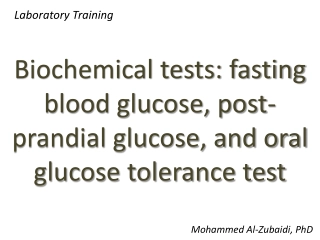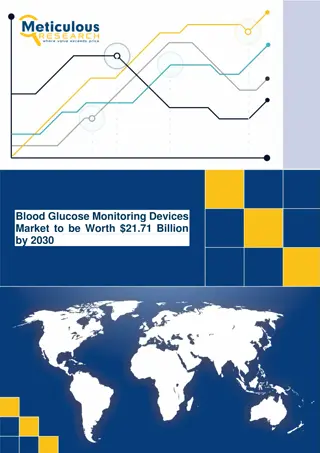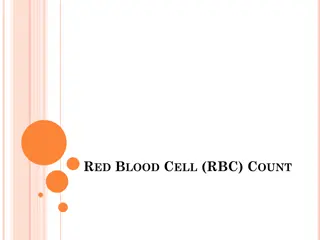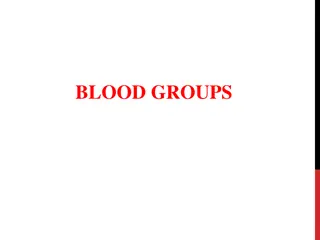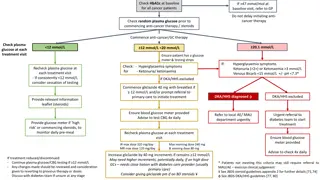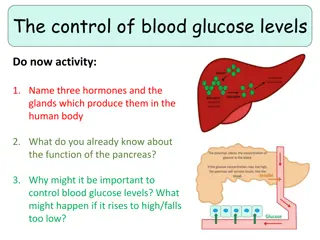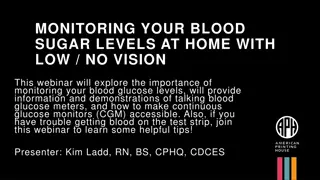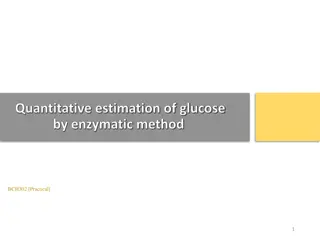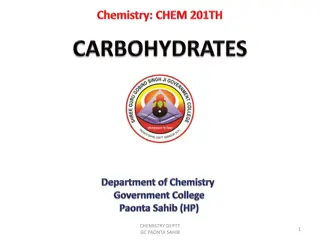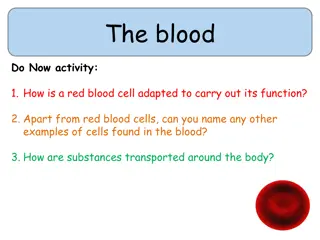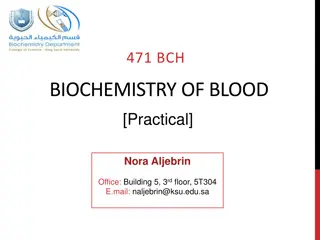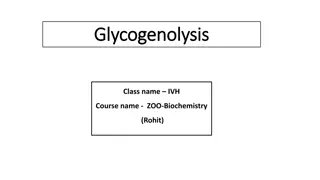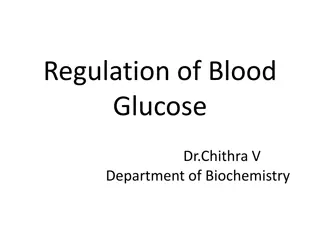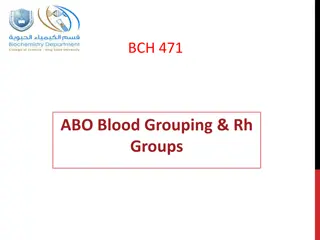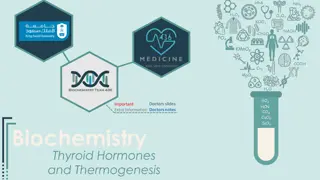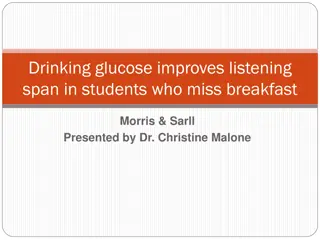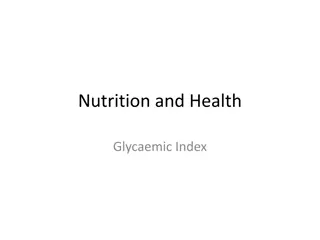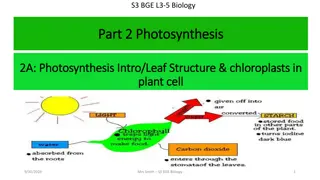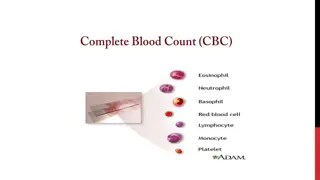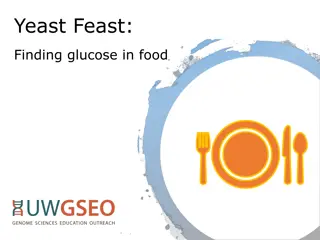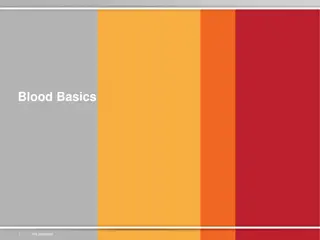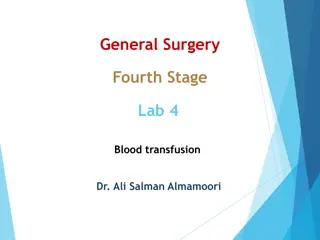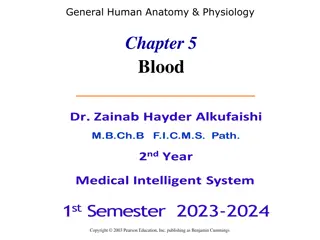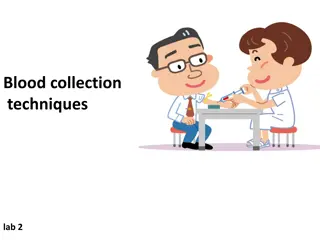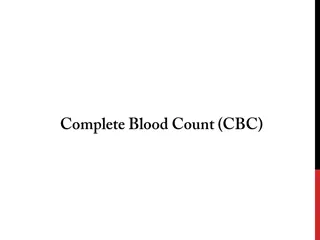Comprehensive Biochemical Tests Training Guide
Enhance your skills in conducting fasting blood glucose, post-prandial glucose, and oral glucose tolerance tests with this comprehensive training guide by Mohammed Al-Zubaidi, PhD. Master the techniques and interpretations for accurate results.
1 views • 42 slides
Understanding Gestational Diabetes: Risk Factors, Diagnosis, and Management
Gestational diabetes is a condition where high blood sugar levels develop during pregnancy in women without pre-existing diabetes. Risk factors include maternal age, family history of diabetes, ethnicity, and obesity. Diagnostic tests involve measuring blood glucose levels, and management includes a
1 views • 15 slides
Transfusion
Blood transfusion is a crucial medical procedure worldwide, with various components like packed red blood cells, plasma, platelets, and cryoprecipitate being utilized for efficient use. Differential centrifugation is employed for component preparation, ensuring precise separation of red blood cells,
2 views • 45 slides
Blood Glucose Monitoring Devices Market to be Worth $21.71 Billion by 2030
Blood Glucose Monitoring Devices Market by Product (Self-monitoring {Glucometer, Test Strips, Lancets}, Continuous Glucose Monitoring {Sensors, Receiver, Transmitter}), Diabetes Type, End User (Self\/Home Care, Hospital, Clinic) - Global Forecast to 2030.
1 views • 3 slides
Understanding How Diabetes Affects Blood Vessels
Diabetes can harm blood vessels, leading to complications due to high blood sugar levels. Hemoglobin A1c plays a crucial role in monitoring glucose control, with values above 6.5% indicating diabetes. Over time, high blood sugars can damage blood vessels, affecting blood flow and increasing the risk
1 views • 19 slides
Understanding Red Blood Cell (RBC) Count and Its Significance in Blood Health
Red blood cells, comprising nearly 45% of blood volume, play a crucial role in oxygen transport. The red blood cell count, measured as the number of cells per unit volume of blood, helps assess the adequacy of oxygen-carrying capacity. Normal values vary by age and gender. The experiment aims to det
8 views • 16 slides
Overview of Glucose Metabolic Pathways in Clinical Chemistry
Explore the major metabolic pathways of glucose, including glycogenolysis, gluconeogenesis, glycolysis, and more. Understand the production, utilization, catabolic, and anabolic cycles of glucose in cellular metabolism. Learn about key concepts such as hexose interconversion, HMP/PPP, Krebs cycle, a
4 views • 29 slides
Case Study: Managing High HbA1c and Normal Fasting Glucose Levels
A case study discusses a 69-year-old woman with a history of stable diabetes facing elevated HbA1c levels despite normal fasting glucose. Initial investigations, including a day curve test, reveal high postprandial glucose levels. The analysis leads to identifying iron deficiency anemia, prompting f
9 views • 22 slides
Understanding the Components of Blood for Better Health
Explore the main components of blood such as red blood cells, white blood cells, platelets, and plasma. Learn how these components function, their percentages in blood, and how they impact human health. Discover the importance of blood donation and how changes in blood composition can affect overall
2 views • 19 slides
Understanding Blood Groups and Their Significance
Human blood types are determined by specific antigens and antibodies present on red blood cells, influencing crucial aspects like blood transfusions and familial relationships in forensic medicine. The ABO system, with its four main blood types (A, B, AB, O), plays a vital role in categorizing blood
7 views • 14 slides
Understanding Glycolysis: The Initial Step in Glucose Breakdown
Glycolysis, presented by Dr. Madhu Kumari Gupta, is a crucial process in cellular metabolism that involves the breakdown of glucose to extract energy. This pathway occurs in the cytosol and consists of three main phases - an energy-requiring phase, a splitting phase, and an energy-releasing phase. T
0 views • 12 slides
Guidelines for Monitoring Blood Glucose in Cancer Patients Undergoing Anti-Cancer Therapy
Guidelines recommend checking HbA1c and random plasma glucose levels at baseline for all cancer patients before initiating anti-cancer therapy. Regular monitoring of plasma glucose levels during treatment is essential, with specific actions based on glucose readings. Immediate referrals and treatmen
0 views • 4 slides
Understanding Blood Glucose Control Mechanisms in the Human Body
This content explores the regulation of blood glucose levels in the human body, covering the role of hormones like insulin and glucagon produced by the pancreas. It discusses the importance of maintaining proper blood glucose levels and the consequences of levels being too high or too low. The text
0 views • 19 slides
Managing Blood Sugar Levels at Home for Low/No Vision
Explore the importance of monitoring blood glucose levels at home for individuals with low/no vision, learn about talking blood glucose meters, and make continuous glucose monitors accessible. Understand why maintaining blood sugar levels is crucial to prevent complications in diabetes, and get tips
2 views • 25 slides
Quantitative Estimation of Glucose by Enzymatic Method in Blood Samples
Estimation of blood glucose levels is crucial for diagnosing and managing conditions like diabetes mellitus. This practical involves using the enzymatic method with glucose oxidase to quantitatively determine glucose levels in serum. The enzymatic reaction converts glucose to gluconic acid and hydro
0 views • 8 slides
Epimerisation of D-Glucose into D-Mannose: Structural Insights
Explore the fascinating process of epimerisation, specifically the conversion of D-glucose into D-mannose. Discover the limitations of open chain structures, the ring structure of glucose, and the evidence supporting it. Learn about the stereochemistry of D-glucose, optical rotation, and the equilib
0 views • 13 slides
Understanding Blood Cells and Transport Mechanisms
Your blood, consisting of red blood cells, white blood cells, platelets, and plasma, plays a crucial role in transporting substances like oxygen, nutrients, and waste products throughout your body. Red blood cells are specialized for oxygen transport due to their unique adaptations, while white bloo
2 views • 18 slides
The Importance of Glycogen in Providing a Constant Source of Blood Glucose
Glycogen serves as a crucial storage form of glucose in the body, ensuring a constant source of blood glucose crucial for brain function, RBC energy, and muscle fuel. This storage form is essential for providing glucose during times of fasting or increased energy demands, with glycogen synthesis and
0 views • 28 slides
Biochemistry of Blood Practical Course Overview
This biochemistry of blood practical course involves various experiments focusing on blood components such as plasma, serum, proteins, enzymes, blood groups, hemoglobin, glucose levels, and more. The course outline includes detailed experiments, marking distribution, guidelines for writing scientifi
3 views • 6 slides
Understanding Glycogenolysis in Vertebrates: A Detailed Overview
In vertebrates, glycogen serves as a glucose reservoir in the liver and skeletal muscles. Glycogenolysis is the breakdown of glycogen into glucose-6-phosphate, crucial for providing glucose to tissues in the absence of dietary sources. Enzymes like glycogen phosphorylase, debranching enzyme, and pho
0 views • 13 slides
Regulation of Blood Glucose and Its Importance in Maintaining Health
Blood glucose regulation is crucial for energy supply in the body, particularly for brain function. Understanding the balance of glucose entering and leaving the blood through processes like absorption, glycogenolysis, and gluconeogenesis is vital. Hormones like insulin and glucagon play key roles i
0 views • 10 slides
Understanding ABO Blood Grouping and Rh Groups
ABO blood grouping and Rh factor testing are crucial for blood transfusions and forensic medicine. The presence or absence of specific antigens and antibodies in human blood determines blood type. Genetic inheritance from parents establishes blood type, with codominance influencing offspring phenoty
0 views • 13 slides
Understanding Glucose Homeostasis in Metabolic Processes
Glucose homeostasis is crucial for controlling glucose metabolism and maintaining normal blood glucose levels in the body. It involves various metabolic sources, including dietary intake and gluconeogenesis. The liver plays a vital role in regulating blood glucose levels, while severe hypo- and hype
0 views • 17 slides
Analyzing the Impact of Glucose on Students' Listening Span
Research presented by Dr. Christine Malone explores how drinking glucose can enhance listening span in students who miss breakfast. The study investigates if the experiment qualifies as a true experiment by analyzing key features like manipulation, measurement, comparison, and control. Internal vali
1 views • 12 slides
Understanding Blood Components and Their Administration
Effective blood transfusion therapy relies on the availability and proper administration of various blood components. Separating blood components allows for better patient care by matching transfusions to individual needs and avoiding unnecessary components. Different blood products like packed red
1 views • 27 slides
Disposable Glucose Nanosensor Development Project
This project aims to develop a disposable glucose nanosensor and testing method to detect a range of concentrations. The goal is to create a low-cost and easy-to-fabricate nanosensor by designing an effective fabrication process. Steps involve cleaning the microscope slide, depositing titanium and a
0 views • 14 slides
Understanding Glycaemic Index in Nutrition and Health
Glycaemic Index (GI) measures how carbohydrate-containing foods affect blood glucose levels. High GI foods raise blood glucose rapidly, while low GI foods release glucose gradually. Studies track impacts on blood glucose levels, insulin secretion, fat storage, and pancreatic function. High GI foods
0 views • 15 slides
Versiti Blood Center of Illinois: Community Impact through Blood Drives
Versiti Blood Center of Illinois, a nonprofit organization, plays a vital role in healthcare by organizing blood drives to ensure a sufficient supply of blood for hospitals in the Chicagoland and Northwest Indiana area. Through employee engagement, community outreach, and raising awareness about the
0 views • 10 slides
Management of Cardiovascular Risk Factors in a Middle-Aged Housewife
Anna, a 40-year-old housewife with a family history of cancer and diabetes, presents with elevated blood glucose levels, high cholesterol, and hypertension. Initial management includes lifestyle changes, medication for blood pressure and cholesterol, and smoking cessation. Follow-up visits show impr
0 views • 15 slides
Understanding the Role of Glucose in Photosynthesis
Exploring how plants use glucose produced during photosynthesis, including its various uses such as providing energy, being stored as starch, and contributing to the formation of plant cell walls and other essential chemicals. The process of photosynthesis, the fate of glucose, and the conversion of
0 views • 11 slides
Understanding Complete Blood Count (CBC) Test
Complete Blood Count (CBC) is a panel of tests that evaluates different types of blood cells, including red blood cells, white blood cells, and platelets. CBC helps diagnose various blood disorders and monitor conditions that affect blood cells, such as anemia or infections. The test is ordered base
0 views • 20 slides
Uses and Conversions of Glucose and Fructose in Chemistry
Glucose and fructose have various uses, including as food for patients and in confectionery. Glucose is also used in silvering mirrors, processing tobacco, and starting material for vitamin C synthesis. Fructose is a sweetening agent and a sugar substitute. Glucose can be converted into fructose thr
0 views • 10 slides
Understanding Glucose and Its Role in the Body
Delve into the significance of glucose as a primary energy source in our diets, the various sources of glucose in food, and the enzymes involved in breaking down sugars. Explore the connection between glucose and type 2 diabetes, emphasizing the importance of maintaining healthy blood glucose levels
0 views • 10 slides
Understanding the Basics of Blood and Transfusions
Blood is a vital tissue that performs essential functions like delivering oxygen and nutrients, maintaining immunity, and controlling body temperature. Blood transfusions save lives by treating accident victims, transplant recipients, cancer patients, and those with blood-related diseases. Component
0 views • 20 slides
Blood Transfusion in Surgery: Types and Indications
Blood transfusion plays a crucial role in surgery, with different blood products such as whole blood, packed red cells, fresh-frozen plasma, cryoprecipitate, and platelets being used based on specific needs. Understanding the indications and proper handling of blood products is essential for safe tr
0 views • 13 slides
Overview of Blood and Hematology: Functions and Composition
The human body consists mostly of water, with blood making up approximately 8% of body weight. Blood is composed of plasma and formed elements, including red blood cells (erythrocytes), white blood cells (leukocytes), and platelets. Plasma, the liquid part of blood, contains various proteins such as
0 views • 12 slides
Understanding Blood: Composition and Functions
Blood is a vital fluid tissue in the human body, classified as a connective tissue. It consists of living cells known as formed elements suspended in a non-living matrix called plasma. The physical characteristics of blood, such as color range, pH level, and temperature, play crucial roles in mainta
0 views • 33 slides
Comprehensive Guide to Blood Collection Techniques in Medical Investigations
Blood collection is a crucial process in medical investigations where blood is withdrawn from patients for analysis. Methods include arterial sampling, venipuncture, and fingerstick sampling, each serving specific purposes. Venous blood is preferred over arterial blood due to accessibility and ease
0 views • 10 slides
Understanding Blood Group and Cross Matching in Transfusion Medicine
Blood group and cross matching play crucial roles in determining blood compatibility for transfusion. The presence or absence of specific antigens on red blood cells, along with antibody reactions, help identify blood types and ensure safe transfusions. Cross matching involves testing donor and reci
0 views • 8 slides
Understanding Complete Blood Count (CBC) Testing
Complete Blood Count (CBC) is a crucial test that provides information about the composition of a patient's blood, including red blood cells, white blood cells, and platelets. This test helps in diagnosing conditions such as anemia, infections, and more. CBC involves analyzing parameters like RBC co
0 views • 20 slides
